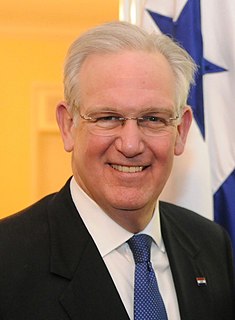A Quote by Marcia Clark
That's who I was: a prosecutor. I really loved it.
Quote Topics
Related Quotes
If a prosecutor in The Hague decides that the U.S. has not followed through effectively on an investigation - is unwilling or unable to carry it through - then that person, that prosecutor, in an unreviewable fashion gets to second-guess the United States? That is unacceptable. That is an assertion of authority over and above the U.S. Constitution.
Based on my experience as a prosecutor in Miami, illegal immigration is one of the most critical issues facing this country. As a prosecutor, I felt the burden of it. I think what's important... is for the state and the federal government and for local governments to work together to do everything possible to control illegal immigration in a comprehensive way.
When I was prosecutor we had truancy and curfew issues and we made a refrigerator magnet, and that was hot with parents. They loved putting it up on the wall and saying, you know, if you don't follow these rules, you could get prosecuted. Whether or not it actually happens, it changes a culture, and that's part of what we're trying to do here.
Although we refer to the International Criminal Court, the real problem is the prosecutor, because it's the prosecutor who decides who to investigate and what cases to bring. This court fundamentally embodied a potential for abuse of governmental power that I felt was inconsistent with being a free person - and [it was] inconsistent for a free country like the United States to subscribe to it.
































